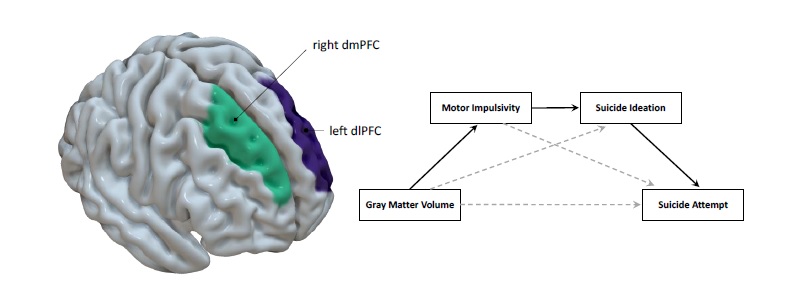Articles
Article Tools
Stats or Metrics
Article
Short Communication
Exp Neurobiol 2022; 31(2): 97-104
Published online April 8, 2022
https://doi.org/10.5607/en22008
© The Korean Society for Brain and Neural Sciences
The Indirect Effect of Prefrontal Gray Matter Volume on Suicide Attempts among Individuals with Major Depressive Disorder
June Kang1†, Aram Kim2†, Youbin Kang2, Kyu-Man Han3 and Byung-Joo Ham3*
1Department of Brain and Cognitive Engineering, Korea University, 2Department of Biomedical Sciences, Korea University College of Medicine, 3Department of Psychiatry, Korea University Anam Hospital, Korea University College of Medicine, Seoul 02841, Korea
Correspondence to: *To whom correspondence should be addressed.
TEL: 82-2-9206-6843, FAX: 82-2-9206-6843
e-mail: hambj@korea.ac.kr
†These authors contributed equally to this article.
This is an Open Access article distributed under the terms of the Creative Commons Attribution Non-Commercial License (http://creativecommons.org/licenses/by-nc/4.0) which permits unrestricted non-commercial use, distribution, and reproduction in any medium, provided the original work is properly cited.
Abstract
Trait impulsivity is a known risk factor for suicidality, and the prefrontal cortex plays a key role in impulsivity and its regulation. However, the relationship between trait impulsivity, neural basis, and suicidality has been inconsistent. Therefore, this study aimed to explore the relationship between impulsivity and its structural correlates (prefrontal gray matter volume), suicidal ideation, and actual suicide attempts. A total of 87 individuals with major depressive disorder participated in study, and the gray matter volume of the prefrontal regions was extracted from T1 images based on region of interest masks. The variables for the mediation models were selected based on correlation analysis and tested for their ability to predict suicide attempts, with impulsivity and suicidal ideation as the mediation variables and gray matter volume as the independent variable. A significant correlation was observed between suicidal ideation and the left dorsolateral prefrontal cortex and right dorsomedial prefrontal cortex. The dual-mediation model revealed a significant indirect relationship between gray matter volume in both regions and suicide attempts mediated by motor impulsivity and suicidal ideation. The counterintuitive positive relationship between gray matter volume and suicidality was also discussed.
Graphical Abstract

Keywords: Attempted suicide, Gray matter, Prefrontal cortex, Suicidal ideation


